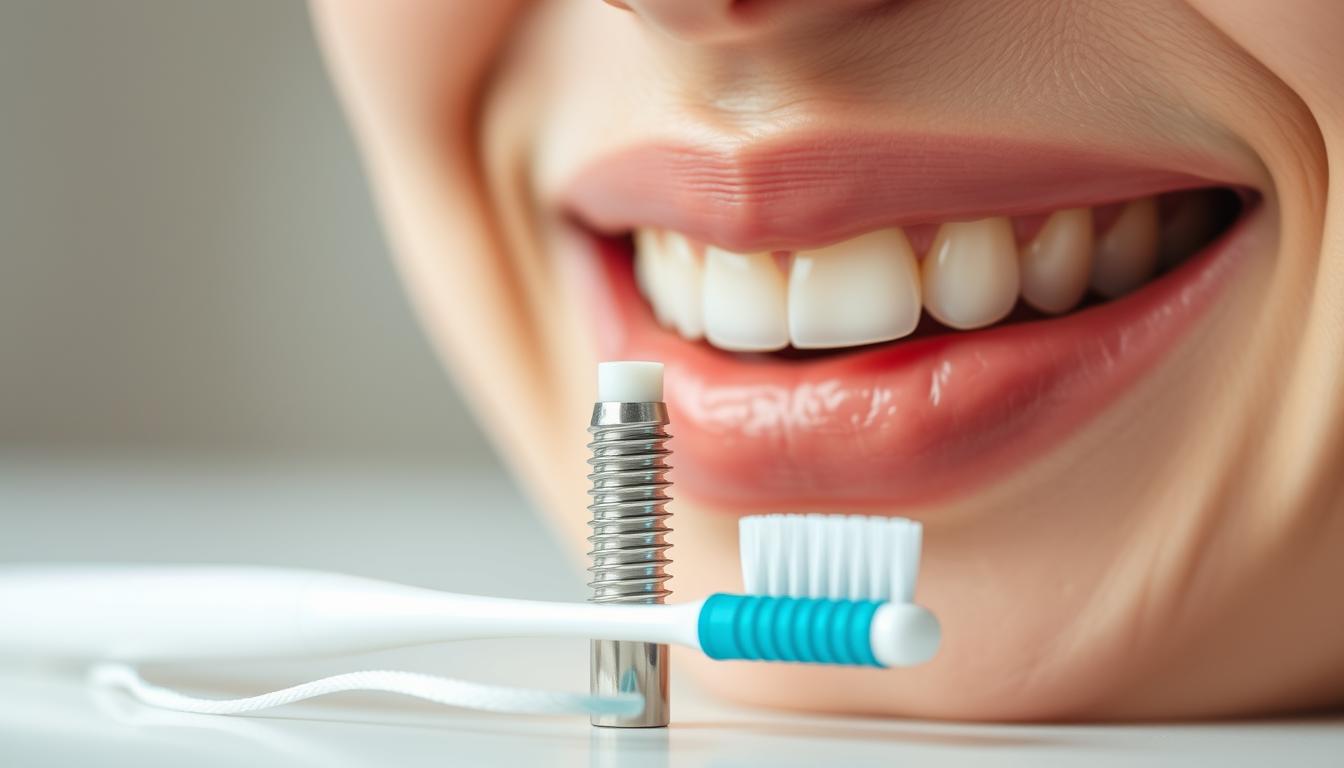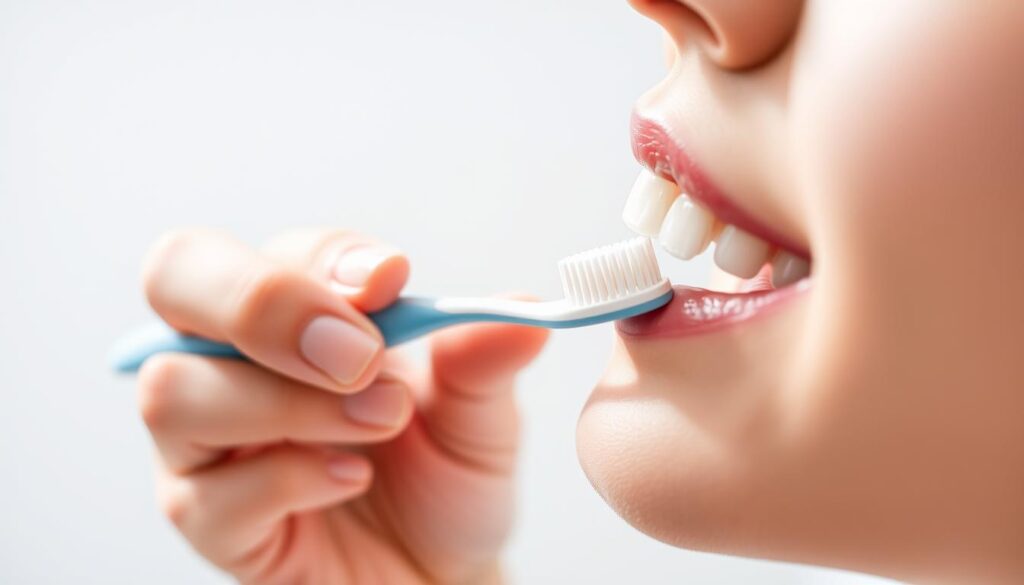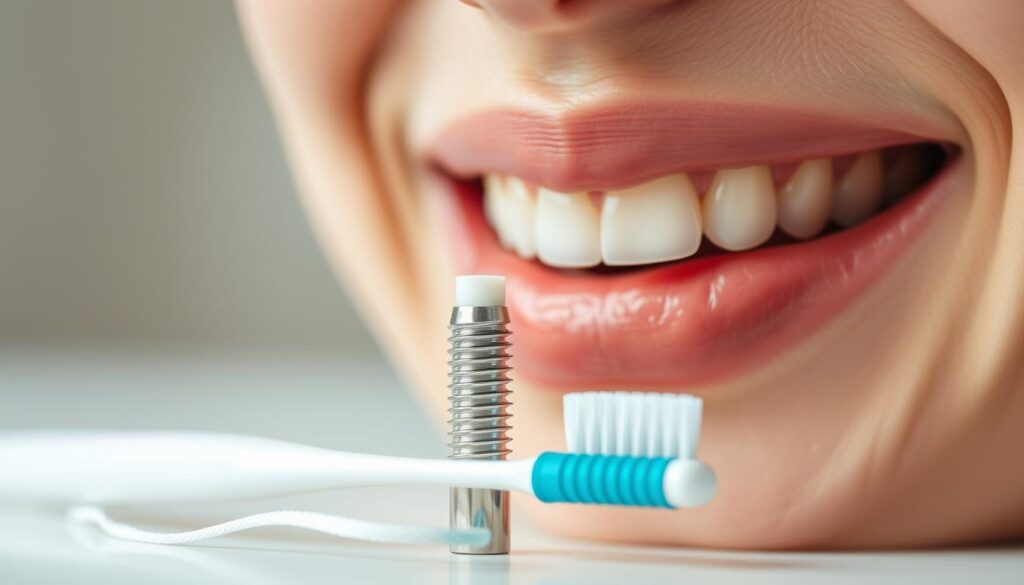Dental Implant Care Guide: Maintenance Tips

Every year, around 500,000 more Americans choose dental implants. Knowing how to take care of them is crucial. Good oral hygiene is key for keeping your implants in top shape. Check out these dental implant maintenance tips.
Dental implants have a success rate of over 95%. It’s important to know how to avoid problems that could harm them. Many people ask, ‘How do I care for dental implants?’ This guide will help clear up the best ways to look after them. Using good oral hygiene and avoiding bad habits can make your implants last longer.
Learning the right way to take care of your dental implants is vital. It will help them last for many years. Knowing these dental implant maintenance tips is essential for anyone. It helps implants become a natural part of their daily routine.
Key Takeaways
- Grasp the importance of regular dental implant maintenance for over 3 million Americans and growing.
- Explore the essentials of oral hygiene for implants to secure a success rate beyond 95%.
- Recognize that effective dental implant care relies on a combination of professional upkeep and personal diligence.
- Understand the role of carefully curated dental implant maintenance tips in prolonging implant longevity.
- Gain knowledge on how proper aftercare can prevent the risks associated with implant complications.
Understanding Dental Implants
Dental implants have changed modern dentistry. They give back the look and feel of real teeth to those missing one or more. These implants are made of titanium posts that go into the jawbone, capped with a custom prosthesis. They perfectly restore the look and function of natural teeth.
Knowing about dental implants is important for anyone thinking about getting them. They can really make a difference.
What are Dental Implants?
Dental implants act as artificial roots, placed straight into the jawbone. The bone grows around the implant, making it secure. This process is called osseointegration. It allows for crowns, bridges, or dentures to be attached. They’re getting more popular and are suggested often for their long-lasting nature.
They are especially recommended by experts for those who take good care of their implants. More on this at dental implant aftercare.
Benefits of Dental Implants
Dental implants have several advantages over bridges or dentures. They look and feel like your own teeth, boosting confidence and comfort. They also keep the jawbone from shrinking, which happens when you lose teeth.
Implants improve overall oral health. They don’t disturb nearby teeth, keeping more of your natural teeth intact. Taking care of them is as easy as brushing and flossing. They last many years with the right care, making them a solid choice for tooth replacement.
- Improved appearance and comfort
- Easier eating and improved speech
- Longevity and reliability
- Preservation of natural tooth structure and prevention of bone loss
With proper care, you can enjoy these benefits for a long time. Taking good care of dental implants ensures their health and the health of the tissues around them. That’s why understanding dental implant aftercare is key.
Initial Care Post-Surgery
Right after getting a dental implant, taking great care of it is super important. The first days after surgery are key to make sure healing goes well. This is very important for the implant to work well for a long time.
The healing process takes time and needs gentle care. Early on, it’s all about keeping the implant site clean to avoid infection. You might need to rinse with saltwater or use special mouthwashes your dentist gives you. It’s crucial to keep the area around the implant healthy to ensure it joins properly with your bone.
In the days after your surgery, it’s important not to put pressure on the implant area. This means avoiding hard foods or rough brushing near the implant. You may need to use a soft toothbrush to clean gently around the site. This helps the healing process.
- Maintain good oral hygiene by using a soft-bristled toothbrush and gentle strokes.
- Avoid smoking, as it impairs healing and can compromise the success of the implant.
- Keep regular follow-up appointments with your dentist to monitor the progress of healing and to ensure the implant integrates well with bone tissue.
Following these steps will make sure your dental implant has a strong start. Every choice, from how you clean your teeth daily to visiting the dentist, is key to making sure your implant works well.
Daily Oral Hygiene for Implants
It’s vital to keep your oral hygiene for implants top-notch to ensure they last long and function well. An effective daily cleaning routine is crucial for avoiding complications. This includes using the right brushing techniques and choosing cleaning aids carefully. These aids help protect your implants.

Recommended Brushing Techniques
To keep your dental implant maintenance on point, choose a soft-bristled toothbrush. Gently clean the crown, abutment, and gums around it. You should brush for at least two minutes, twice a day. When brushing, move the brush in circles to reach all areas. Be extra gentle near the implant to not irritate your gums.
Choosing the Right Toothbrush and Toothpaste
Choosing the right toothbrush and toothpaste is crucial for tips for implant care. Always opt for a toothbrush with soft bristles. This prevents scratches on the implant surfaces. Also, use a non-abrasive toothpaste. This helps in avoiding damage to the implant and its crown.
Importance of Flossing
Oral hygiene for implants includes regular flossing. Flossing removes plaque and food from hard-to-reach spots, especially under the prosthesis and around the abutments. Use unwaxed tape or floss made especially for implants. This ensures a good clean without harming the surrounding soft tissues.
- Brush twice daily with a soft-bristled toothbrush.
- Use low-abrasive toothpaste.
- Floss daily with implant-specific products.
Following these steps will keep your implants healthy. They play a big part in the success of dental implant maintenance.
Diet and Nutrition Post-Implant
Optimal healing after dental implant surgery depends a lot on the patient’s diet. Knowing what foods to eat and what to stay away from can really help care for dental implants. Good nutrition is key to recovering well and keeping dental implants healthy long-term. Here, we highlight important diet tips to aid healing and keep your dental implants lasting long.
Foods to Avoid After Surgery
- Hard foods, like nuts and candies, that can disrupt the surgical area.
- Sticky foods, such as caramel and gum, which push too hard on implants.
- Very hot foods and drinks that might bother the healing spots.
Recommended Dietary Choices for Healing
- Soft fruits, cooked veggies, and grains that are gentle to chew and digest.
- Protein-rich foods like eggs, fish, and tofu help repair and grow tissues.
- A lot of fluids, mainly water, to stay hydrated and healthy.
By choosing your diet carefully and looking after your nutrition, you’re doing more than just looking after your dental implants. Making sure your body gets enough vitamins and minerals is crucial. It helps the implant bond well with the jawbone and keeps your mouth healthy.
Regular Dental Check-ups
Regular check-ups are key to keeping dental implants working well. They help keep dental implants clean and check for any problems early. This stops small issues from becoming big ones.
At these visits, experts use special tools for dental implant aftercare. They make sure the implants and gums stay healthy. They also do X-rays to spot any early signs of trouble, such as peri-implantitis. This problem can harm the implants if it’s not caught early.
| Check-up Frequency | Purpose of Visit |
|---|---|
| 3-6 Months | Assessment of implant stability and cleanliness |
| Annually | Comprehensive evaluation and professional cleaning |
| As Needed | Addressing any discomfort or unusual symptoms |
How often you need a check-up depends on your situation. People who take good care of their implants may need fewer visits. But some might need to see their dentist more often. To find the best care plan for you, talk to a dentist who knows about implants. Check out this guide for more on how often to get a dental cleaning and exam.
But check-ups aren’t just for keeping dental implants clean. They’re also a chance to learn how to care for your implants better. And they help make sure your care plan is just right for keeping your implants safe and sound.
Handling Dental Implant Complications
Dental implants have a high success rate, but sometimes problems do happen. It’s key to know how to maintain them properly. Spotting issues early and taking action helps keep your implant and mouth healthy.
Learning how to care for your tooth implant is vital. Noticing symptoms early can stop bigger problems or even failure.
Identifying Signs of Infection
Here’s what might show you have an infection or other issues:
- Constant discomfort or pain at the implant area
- Swelling or redness that sticks around
- Bleeding when you brush or floss near the implant
- The implant feels loose or seems to move
What to Do in Case of Implant Failure
Seeing any of these signs? Get help from a dentist right away. Catching problems early is crucial in taking care of your implant. It could stop further issues.
Here’s what you should do:
- Call your dental expert immediately.
- Keep your mouth clean, but be gentle near the sore spot.
- Follow the dentist’s advice and don’t miss any check-ups.
Keep an eye on your caring for tooth implants habits. This way, you help ensure your dental work lasts and stays strong.
Protecting Your Dental Implants
Dental implants need more than just brushing and flossing to last long. If you play sports or enjoy hard and sticky foods, it’s important to take extra steps to protect them. Knowing how to keep your dental implants in good shape is key to their lasting success.
Not wearing a mouthguard during sports can be bad for your implants. A mouthguard can really help by protecting your implants from being hit during activities. This easy step is a big part of keeping your dental implants safe.
What you eat also affects your dental implants. Avoiding hard or sticky foods helps keep the implants from getting damaged. It’s not just about cleaning your teeth well but also being careful with what you eat.
If you’re asking how to look after your dental implants, here are some useful tips:
- Wear a mouthguard custom-made for you when you do sports or other physical activities.
- Don’t chew on hard things like ice, hard candies, and crunchy fruits and veggies.
- Avoid sticky candies and sweets that could stick to and pull at the implant.
- Keep up with a detailed dental hygiene routine that’s designed for dental implants.
Follow these guidelines to keep your dental implants in great shape. This will help you have a healthy, good-looking smile for a long time.
Maintaining Bone Health
The health of your jawbone greatly affects how well dental implants work. Taking good care of your dental implants not only makes them last longer but also keeps your face and jaw healthy. It’s very important to understand how much calcium and Vitamin D matter. Also, sometimes you might need bone grafting to take care of your tooth implants properly.
For strong bones, calcium and Vitamin D are super important. This strength helps keep dental implants in place. Not having enough of either can cause bones to weaken. This puts the implants at risk. So, keeping a diet rich in these nutrients is part of taking care of implants.
| Nutrient | Benefits | Recommended Sources |
|---|---|---|
| Calcium | Strengthens bone structure, essential for implant support | Dairy products, leafy greens, fortified cereals |
| Vitamin D | Facilitates calcium absorption, enhances bone growth | Fatty fish, sunlight, fortified dairy and juices |
If your bones aren’t thick enough for implants, you might need a bone graft. This means enhancing your bones so they can hold the implant well. This shows just how crucial healthy bones are when you’re taking care of dental implants.
Lifestyle Changes for Better Implant Care
Making healthier choices is a key part of taking care of dental implants for the long run. We’ll look at how staying away from certain things greatly helps keep implants clean.
- Avoiding Tobacco ProductsOne of the most important pieces of advice for implant care is to stop using tobacco products. Tobacco smoke has bad chemicals that slow down healing, raising the chance of the implant not working. It messes with how well the implant becomes part of the jawbone.
- Limiting Alcohol ConsumptionCutting down on alcohol is also good for your implants. Drinking too much alcohol can hurt the healing of gums. This could make it hard for the implant to stay put. Drinking less is important for keeping your implant in good shape for a long time.

These changes in lifestyle help your dental implants last and keep your mouth healthy too. Go for regular check-ups and take good care of your mouth to get the most out of your dental implants.
Understanding Implant Longevity
Dental implants have changed the way we look at dental care. They are strong and look just like real teeth. The life of these implants greatly depends on how do I care for dental implants, proper upkeep, and lifestyle choices. We will look at what makes dental implants last longer.
Most dental implants can last a lifetime, often with a success rate over 95%. To reach this, strict dental implant aftercare is key. This includes good oral hygiene and regular dental check-ups and cleanings.
caring for tooth implants is more than just brushing and flossing every day. Patients should follow complete care routines given during dental visits. Now, let’s look at what practices can help extend their life:
- Regular Professional Cleaning: Dental professionals are crucial in keeping implants healthy. They remove plaque that’s hard to get to, which can cause gum disease.
- Avoid Hard and Sticky Foods: These foods can harm the implant and the crown, shortening the life of your dental work.
- No Smoking: Smoking can slow healing in the mouth, harming the way implants settle in.
- Immediate Attention to Discomfort: If there’s discomfort or something feels off, see your dentist right away. This helps stop bigger problems before they start.
Understanding and following dental implant aftercare advice is key to keeping your implants as a healthy part of your smile for years.
The Role of Dental Hygiene Products
Keep dental implants healthy with the right hygiene products. These keep your oral health in top shape, making your implants last longer and work better.
For those with dental implants, a special daily care plan is key. This includes unique mouthwashes and cleaning tools made just for implants.
Recommended Mouthwashes and Rinses
Picking the correct mouthwash prevents implant infections. Dental experts suggest antimicrobial rinses to keep implants safe. They fight off bad bacteria around implants.
Specialty Tools for Implant Care
Special tools help clean implants well. Items like water flossers and brushes made for implants take away plaque and bits your regular brush can’t. These tools are safe for your implants and gums.
- Water Flossers: Utilize water pressure to clean difficult-to-reach areas around implants.
- Implant-Specific Brushes: Feature soft bristles and unique angles to gently and effectively clean around implants.
Using these special dental care items daily helps implants last and work well. Making these tips a habit results in less trouble with dental implants.
Educating Others About Your Implants
Talking about how to care for dental implants is important. It’s key to let friends and medical workers know how to look after them. This way, people with new implants can get the support they need. They’ll know how to keep their dental implants in good shape.
Communicating with dentists is key. You should talk about your dental implant care with your dentist. They can give you advice that fits your needs. This conversation can also help with any challenges you might face.
Informing family and friends helps spread understanding and support. Tell them how to care for dental implants. You might have to avoid some foods and clean your teeth gently. This helps them understand your daily care routine.
Here are some tips to share with people close to you:
- Avoiding contact sports without proper protection for your implants.
- Knowing the signs of problems so they can spot any issues early.
- The importance of regular check-ups for your dental and overall implant health.
Talking openly with everyone helps avoid misunderstandings about your health choices. It’s all about the support from both professionals and your community. This support is key for a good outcome with dental implants.
Educating others about implant care is not just about following the rules. It’s about making your dental care a smooth part of your life. Keeping everyone informed helps your recovery and care go well. It makes a big difference in how long and how well your dental implants last.
Cost of Dental Implant Maintenance
Knowing how much it costs to keep dental implants in good shape is key. You need to budget well and make sure they last. Good care includes regular cleanings and check-ups. We’ll look at how to handle these costs and what insurance might do to help.
Budgeting for Care and Check-ups
To look after dental implants right, plan for routine dentist visits and professional cleanings. It’s not just about keeping your mouth clean. It also prevents issues that could end up costing more. Here’s what you should think about for implant care:
- Schedule regular dental check-ups every six months to ensure the implants are in good condition.
- Invest in specialized cleanings that are designed for dental implants to prevent peri-implant diseases.
- Consider setting aside a small monthly amount specifically for dental care to avoid large unexpected expenses.
Insurance Coverage Insights
What insurance covers for dental implants can really change depending on the plan. It’s smart to talk to your insurance and dental care provider to know what’s covered. Here are key questions to ask:
- Does the insurance plan cover the initial placement of dental implants, and to what extent?
- Are regular maintenance appointments and cleanings covered partially or fully?
- What are the stipulations for coverage in case of implant failure or complications?
Fully grasping these factors can help cut down your costs and ensure the implants last a long time.
Common Myths About Dental Implants
Many people believe the wrong things about dental implant maintenance and how to use them every day. This stops them from choosing a great dental option. By clearing up these myths, we can help potential and current users know how easy it is to take care of dental implants.
A big myth is that dental implants need a lot of special care every day. But the truth is, caring for oral hygiene for implants is just like for real teeth—brushing and flossing keep them healthy. Another wrong idea is that you can easily spot implants or that they’re uncomfortable. Yet, dental tech has gotten so good that implants look and feel just like your own teeth.
- Implants are as durable as real teeth and can chew most foods.
- Right oral hygiene for implants helps avoid most issues.
- Seeing your dentist for regular checkups and cleanings keeps your implants in top shape.
By fighting these myths, we help people understand and feel ready to caring for tooth implants well. The aim is simple care that ensures implants last long and work well, much like caring for natural teeth.
Transitioning to Life with Implants
Getting used to dental implants is a journey that goes beyond just the physical changes. It includes emotional and social shifts too. Learning how they work in everyday life and their strength is key. This understanding helps ensure happiness and comfort over time.
Right after getting implants, taking good care of them is essential. But, that’s not the whole story. How do I care for dental implants so they fit smoothly into my lifestyle? This is a question many people think about. It’s about keeping them clean and getting used to the new experiences they bring.
Understanding how dental implants affect you mentally can make adjusting to them easier.
Here are some tips for implant care that help with emotional and social changes:
- Talk openly with your dentist about what to expect to lessen worry.
- Go to all follow-up visits to check on your implants’ progress.
- Meet others who have implants to exchange stories and advice.
- Stay positive about the changes and see them as improvements in your life and health.
Support from loved ones means a lot during this change. They help you focus on the good sides of getting implants, like better looks and function. Now, you can face social situations with more confidence, without feeling self-conscious about your teeth.
Frequently Asked Questions About Implants
Today, we’ll dive into common questions on caring for dental implants. It’s typical for new implant owners to have many questions. These range from what cleaning tools to use, to how to maintain oral hygiene for implants. Knowing this is key to keeping dental implants clean and making them last.
To avoid issues, it’s vital to use proper tools and techniques for dental implant maintenance. We’ll clarify these matters for people who recently got implants.
| Question | Answer |
|---|---|
| What type of toothbrush should I use? | Choose a soft-bristled brush made for implants to prevent scratches. |
| Is flossing necessary for implants? | Yes, floss daily to remove plaque and debris around implants, avoiding infections. |
| Can water flossers be used? | Water flossers are great for keeping dental implants clean and are helpful for those who struggle with traditional flossing. |
| Do I need to use a mouthguard? | Use a custom-fitted mouthguard to protect your implants if you play contact sports or grind your teeth at night. |
| How often should I visit the dentist? | Seeing your dentist every 6 months is crucial for checking your implants’ health and ensuring they work well. |
Having the right knowledge ensures better care for your dental implants. For advice that fits your unique needs, always talk to your dentist.
Resources for Ongoing Care and Support
Getting dental implants means you need a solid aftercare plan. It’s important for patients to always learn and get support to keep their mouths healthy. With so many resources out there, finding reliable advice tailored to your needs is key. Health experts must guide patients to the best care for their dental implants.
Organizations like the American Society of Implant & Reconstructive Dentistry (ASIRD) are key. They offer deep knowledge and help in the field. They lead in giving care tips for implants and bring the latest in guidelines and research. They also hold seminars and conferences for those looking to grow in implant dentistry. These help professionals improve through continuous learning.
For patients, online forums and communities provide a space for sharing and advice. These places offer real-life experiences and tips from others who have implants. They help round out care beyond what the clinic offers. This network makes it easier to manage dental implants, balancing doctor’s advice with day-to-day life.


